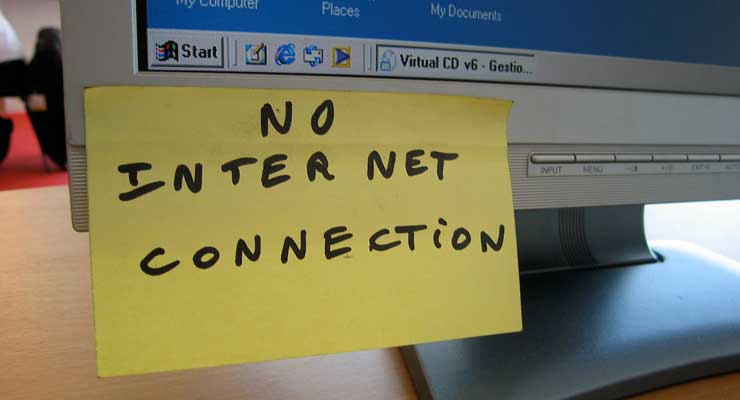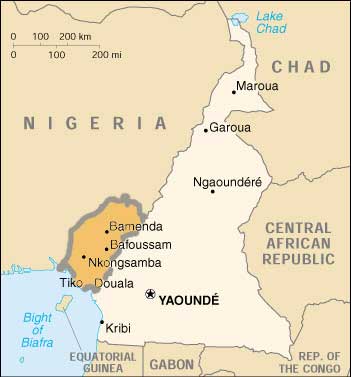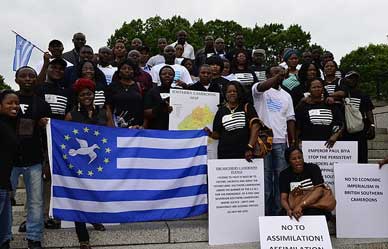
Perhaps the gravest of human rights violation in Africa perpetrated by a government in the last 10 years, if at all there is one, is currently going on in the West African country that styles itself the Republic of Cameroon or La République du Cameroun (LRC, in French). And yet the United Nations has stayed quiet about the issue, making only vague and diplomatically charged statements through the special envoy of UN Secretary General (UNSG) to Central Africa, Mr. François Lounceny Fall. The Office of the UNSG has remained mum despite all the protest marches in front of the UN building in New York City, protests at UNSG offices elsewhere in the world and all the petitions sent to UNSG by the victims of this oppression.
Scene Setting for an Internet Shutdown
Cameroon is known internationally for its world class football, its 34 year old government and a 56 year old regime. The government happily uses the national football squad to keep the people distracted while development is sacrificed.
Cameroon is known to be a peaceful country, peace here meaning the absence of armed conflict. However, what many people don’t know is how this peace has been kept and why conflict has not escalated despite the growing anger and dissatisfaction in the increasingly impoverished and confused population.
The current regime has benefited from historical, geographical, anthropological and economic factors that have made the population rather docile and patient. The regime has succeeded in governing through constitutional uncertainty with unjust laws, a lack of accountability, denial of justice, deliberate enhancement of poverty, and the systematic destruction of education backed up by propaganda spread through its unpopular national television in support of personality cults. The regime has endorsed the subjugation of the people to French colonial interests, debasing its own population with added un-progressive Chinese cooperation, bullying and the use of unrestrained military force aimed at physically eliminating any outspoken opponent or protest in support of its neo-patrimonial patron-client corrupt tribalistic political system, etc, Yet the regime thinks it is solely responsible for keeping Cameroon peaceful. Unfortunately, this fascist style of government has natural limits and has only succeeded in ensuring a frightful future for Cameroon.
There have been moments in the history of Cameroon when the people have expressed their dissatisfaction with their condition. Yet, they were met with brutal repression that succeeded to gag them further. However, recent events related to Cameroon’s unique colonial and post-colonial past have begun to see the materialization of above mentioned frightful future for Cameroon. This frightful future is that of a Cameroon where the fascist tactics have begun to fail and where the country becoming more and more unstable. Even then, the regime will be unable to repent – which is normal enough.
Fascists will remain fascists. The events in question are related to protests by a more expressive part of the population that constitutes a people who consider themselves as annexed by another part, or should I say by the government that originates from that other part.
What led to the internet shut-down?
British Southern Cameroon (BSC) natives have remained aware of their history and know that they have a State of their own. The drowning of BSC voices that have peacefully asked for a return to a Federation has led to the creation of pressure groups that have gradually radicalised and changed position to separation (not secession). Since the months of October and November 2016 strikes by lawyers of the Common Law system who are majoritarily, if not entirely lawyers from the BSC territory or what has become known as Anglophone Cameroon, and by Anglophone teachers trade unions have grounded the legal and educational systems of Anglophone Cameroon coterminous with the BSC territory.

The lawyers and teachers and other Anglophone trade unions, notably the economic operators and taxi-drivers and motorcycle drivers trade unions formed the Cameroon Anglophone Civil Society Consortium (CACSC) to put added pressure on Government to respect their cultural heritage in the legal and educational sectors.
The CACSC strategy was Ghost Towns. The strategy has been very well respected throughout the BSC territory known since after 1972 as North West (NW) and South West (SW) Provinces, later Regions. This angered the Government and its offers of negotiations led to exacting serious human rights abuses on the protesting population through arbitrary killings, rape, torture, kidnappings and destruction of private property by its police, army and gendarmerie squads composed mainly if not entirely of francophones.
After another successful Ghost Town on the 16-17 January 2017 after the one of the January 9, the Government “outlawed” the CACSC and one other pressure group known as the Southern Cameroons National Council (SCNC) and proceeded to arrest its leadership. Some of the leaders escaped abroad.
Killing the Web
From the 18th of January 2017 the regime proceeded to shut down the internet for the entire BSC territory in a measure of collective punishment and a show of cowardice and a manifestation of fascism at its best. The Minster of Communication, now popularly known as the ‘Minister for Propaganda’ or the ‘Goebbels of Cameroon’, gave the most ludicrous explanation that the internet was cut-off because Anglophones still needed to “learn” how to use it.
Three months later, and the internet is still not available to the people of BSC. Despite protests and calls to the international community, the embassies in Cameroon’s capital of Yaounde and the UN itself, have been mum. No African country has ever witnessed this this type and duration of internet shut down. Yet, it goes unpunished in and for Cameroon.
From Ghost Towns to Kangaroo Tribunals
Despite all the repression and abuse of their online and offline rights, BSC nationals have opted to remain peaceful. They have maintained the tactics of Ghost Towns that have successfully paralysed the educational system and the courts in the NW and SW Regions or in their own territory. All they asked for was that the Government should stop sending francophones to teach their children in broken English and that Civil Law Magistrates should no longer be sent to Common Law Courts. The response from the Government has been at the fringes of the Rwandan Genocide.

The CACSC leaders who escaped arbitrary kidnapping for judgment in kangaroo military tribunals in Yaounde have succeeded to unite all the BSC liberation movements under one banner called the Southern Cameroons Ambazonia Consortium United Front (SCACUF) that has encouraged the population to stay peaceful.
SCACUF and has now ignited a process which it believes will lead to the independence of BSC in accordance with UN Law. Their strategy has led to the promise of an interim Government for BSC in May and the creation of a broadcasting corporation, the Southern Cameroons Broadcasting Corporation (SCBC) free on Satellite TV.
The SCBC is intended first to beat the Government’s internet shutdown aimed at preventing the circulation of information by encouraging the people of BSC to become aware of their history and to be aware of the human rights abuses the Government or whatever it is that is ruling Cameroon, a clique, a rogue cabal, is perpetrating on the people. The aim too is to let the world know about the unique history of enslavement that the people of BSC have suffered since 1961.
Conclusion and a Proposed Way Out
Why does the UN remain an accomplice to such levels of human rights violations? It is probable that the people of BSC are suffering this abuse of their online rights because of French influence in the UN? Is the UN simply the private property of the UN Security Council where its members can agree on how to ‘use the world’? Is it the lot of Africans, to remain slaves forever, with enslavement managed by their own fellow black African brothers?
No individual, be s/he Premier, President, King or Emperor, should have the power to do this to a people and go free. The regime in Yaounde, at the helm of which is Paul Biya, a President who spends most of his time out of the country, is responsible for the separatist anger of the BSC natives who have done nothing for decades but ask for a return to the federation.
Nothing obtained by force ever lasts. The only way out of this dilemma for Francophone Cameroon and Anglophone Cameroon to stay together is:
(1) The non-negotiables
- The re-establishment of the internet;
- The immediate release of all who were kidnapped by forces of the regime and taken to Yaounde;
- The immediate granting and application of the demands of Anglophone lawyers and teachers;
(2) The negotiables on equal terms
- A re-negotiation of a two-State federation with SCACUF under UN, USA and British mediation; The federation must be in loose association;
- A referendum organised only in BSC as to whether the people there wish to accept the Federation or whether they wish to part ways.
If Yaounde thinks illegality can become legality and that force and gagging of critics can solve matters then the responsibility of a separation of BSC from LRC can only be that of the francophone led regime in Yaounde. The UN must stop its silence on this issue and avert genocide on the people of BSC that many think is under preparation by a certain “Black Cabinet”[i] in Yaounde.
–
[i] An appellation coined by Maurice Kamto, a former Government Minister and current opposition party leader, for the clique that is governing Cameroon in the shadows and masterminding dictatorship and fascism.
Leave a Reply